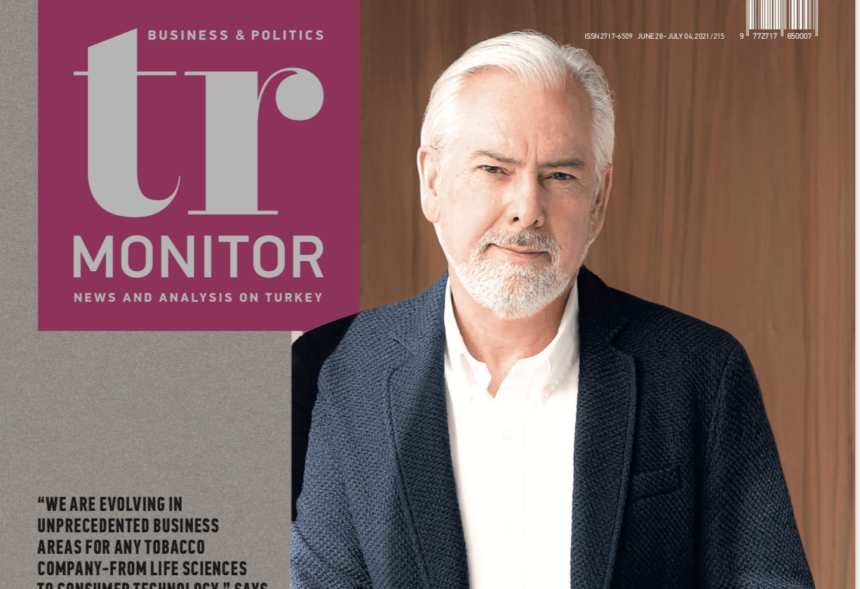BY HUSNIYE GUNGOR
Leading international tobacco company Philip Morris International (PMI), which started as a shop on London’s Bond Street in 1847, is going through a dramatic change. The company is building its future on smoke-free products that are a much better health choice than smoking. The change was initially announced by André Calantzopoulos, who handed over the CEO role to Jacek Olczak in May to become a chairperson on the executive board. “Jacek is ideally placed to deliver PMI’s smoke-free vision,” Calantzopoulos said on May 5 as he handed over the CEO position. “His passion for the company and our employees underpins his drive for results, as does his deep knowledge of our products, systems, values, and investors.”
Olczak, who began his career with PMI in 1993 and took on several management roles across Europe, had been Chief Operating Officer since 2018 before taking on the CEO position. He says he is committed to accelerating PMI’s smokefree transformation, announced in 2016, when the company announced it would focus on developing, scientifically substantiating, and responsibly commercializing smoke-free products that are less harmful than smoking.
“Think of a company that has the ambition to replace—with the help of technology and science—its core line of business, products that have been sold for over 100 years, with better alternatives. That is Philip Morris International (PMI),” Olczak says, adding that he is proud to be part of this journey and humbled to lead such a disruptive transformation.
PMI is transforming from a leading conventional cigarette manufacturer into a science and technology innovator, he adds, and spearheading change in the industry. PMI is the only tobacco company among the European Patent Office’s top 50 patent filers, with a portfolio of over 1,800 granted patents and almost 4,000 pending applications published for intellectual property generated during the development of its novel products.
“We are evolving in unprecedented business areas for any tobacco company—from life sciences to consumer technology,” he says adding that such a transformation requires disruptive innovation and diverse functions working together toward this vision and each and every unit of the organization to be committed to achieving this vision.
“I have been with the company for nearly 30 years, and I am inspired every day by how far we have come. I know that in the next five, 10, and 15 years we will be a much different company, taking innovation ever further, for the betterment of society. There is much more we can do by leveraging our learnings and capabilities in science and technology, and we have plans to do so, to go beyond nicotine as well. But each thing in its time.”
How will this leadership change contribute to the process while going through such a major transformation? Referring to his predecessor’s announcement back in 2016 on PMI’s will to stop selling cigarettes as soon as possible, Olczak says: “I will continue on the path he forged and accelerate our progress and growth as we work to reduce (and ultimately eliminate) the role of cigarettes in our business,” he says.
The new CEO of PMI also takes great pride in the strides they have made in less than a decade toward the better future they envision. PMI’s smoke-free business generated almost 30% of its total global net revenues in the first quarter of 2021, just five years after their initial market launch. The ambition is to increase this to 50% by 2025.
FOCUS ON TURKISH START-UP ECOSYSTEM
Alongside the dedication of the management team, digitalization is also an important pillar of this transformation, the CEO notes. “From our products to our business model, we embrace and develop new technologies to offer faster, better solutions to our internal and external customers,” he says stressing that cross-industry collaboration is crucial for faster deployment of new technologies.
That is why since 2016, the company has channeled its focus into the entrepreneurship ecosystem in its four main investment corridors – consumer, life science, operations and product – under PM Equity Partner, the corporate venture capital arm of Philip Morris International, because they believe it is important to consider current trends and innovations as well as being very good at their own R&D. To stay connected with startups around the world by leveraging its global network, PM Equity Partner has made 11 investments since 2016 in innovative start-ups that support PMI’s vision. PM Equity Partner also has a special focus on the Turkish start-up ecosystem and holds competitions and events in Turkey, Olczak underlines.
“We also collaborate with start-ups within our business model, as we do in our Turkish affiliate Philip Morris Sabanci, which is leading the digitalization of the fast-moving consumer goods (FMCG) industry in Turkey. We are proud that the Turkish B2B digitalization project is a best-practice example in PMI— it is being deployed in other countries as well.”
DESIGNING A SMART WORK STRUCTURE
As the senior executive of a global FMCG company, Olczak believes that the COVID-19 pandemic has disrupted life as we know it. The ways we work will be greatly evolved post COVID-19, he foresees. “We have learned from the pandemic that flexibility is important and that there is no one solution that fits all,” he notes, adding that PMI is in the process of designing a smart work structure to best meet these ever-changing needs.
“An important pillar of PMI’s transformation is to become a data-driven organization from top to bottom” he says. To him, being data-driven is not simply making all your decisions based on relevant data, it is also internalizing data abilities within the organization to improve how you work and your business results. Olczak believes that digitalization will remain an important part of our lives going forward. “I believe it is important to be flexible and data-driven to remain a future-proof company to lead the inevitable change that is happening around us,” he says.
“SUSTAINABILITY: TAKING EVERY STEP TO REPLACE CIGARETTES WITH SMOKE˹FREE ALTERNATIVES”
Philip Morris International believes that what a company makes is as important as how it makes it and that their purpose of achieving a smoke-free future must be conducted sustainably. For CEO Jacek Olczak, the word sustainability is not limited to protecting natural resources and the health and safety of the people they work with and the communities they live in. Sustainability is an opportunity for innovation, growth and long-term value creation for the company, he says, a tool to minimize the negative impacts while maximizing the operational efficiency and resource allocation. “Sustainability stands at the core of our transformation and helps us as an organization address some of the challenges resulting from our ongoing transition while spurring innovation, allowing us to secure success over the long term. Sustainability means for us first and foremost taking every step to replace cigarettes with smoke-free alternatives. Innovating for better products is therefore at the core of our corporate strategy. It is embedded into every part of our business—from how we source tobacco and care for our workers to how we are reducing our environmental and social footprint, in addition to the ways in which we are addressing post-consumer waste.”
USD 1M BUDGET TO COMBAT ILLICIT TRADE IN TURKEY
Philip Morris International has ambitious carbon neutrality targets within its direct operations for 2030. “We pave the way with solid initiatives to meet them”, says CEO Jacek Olczak, citing PHILSA, one of their largest production facilities located in Izmir, as an example in waste management. The recycle ratio of production waste is already 99% at PHILSA, he notes. As the biggest buyer of Turkish Oriental Tobacco, PMI is implementing projects for sustainable tobacco farming, as well, such as its Good Agricultural Practices (GAP) and Agricultural Labor Practices (ALP) programs. “The prevention of illicit trade of tobacco products is a priority issue we address with our relevant stakeholders. There are currently two projects under PMI Impact in Turkey, with a budget of approximately USD 1m, to find innovative solutions to combat illicit trade.”
WOMEN TAKING THE LEAD
PMI’s products are commercialized in over 180 markets around the world, and the company has more than 70,000 employees. It is the diverse hearts and minds of those 70,000 people that enable the company’s great transformation, according to Philip Morris International CEO Jacek Olczak. “We also know that if you are not inclusive, diversity doesn’t matter. So, at PMI, inclusion and diversity is not only about gender—it’s a multigenerational workforce, it’s disability inclusion, it’s mental well-being, it’s advancing in our diverse and inclusive culture,’ he says. PMI has a separate business unit that directly reports to Olczak to oversee R&D efforts around the globe. “For instance, in our Turkish affiliate, half of the management team—including the MD—are women leaders. We are very proud of that, but our focus is not solely limited to meeting the targets that we set for ourselves in terms of representation, it is to make sure that every diverse mindset has a seat at the table where we make decisions and every voice is heard.”










